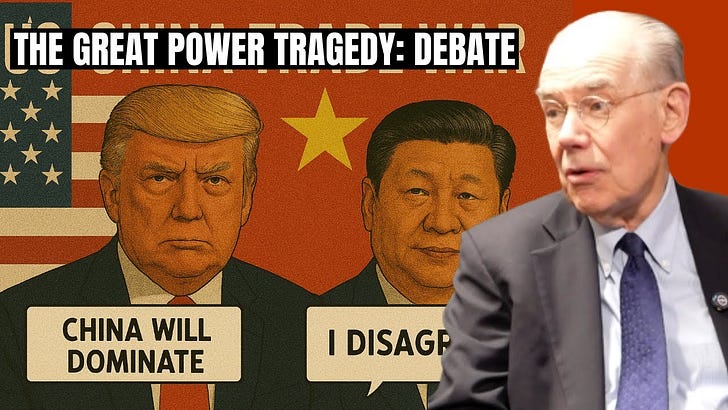John Mearsheimer on his realist theory of great-power politics and Trump 2.0 diplomacy on the Russia-Ukraine War
This is a long, wide-ranging interview from last week by Jyotishman Mudiar with Über-Realist John Mearsheimer in which his interviewer is coming from a distinctly left perspective.1
Mudiar presses Mearsheimer on how to understand the grand scheme of his particular realist view, which Mearsheimer himself calls “offensive realism” - as distinct from the “defense realism” of his colleague and sometime collaborator Steven Walt. I relate more to Walt’s analyses. But since early 2022 when the Russia-Ukraine War started (or escalated, depending on your definition), Mearsheimer has been giving often several interviews per week on YouTube podcasts, so his commentary has been very accessible to anyone with YouTube access.
In this interview, Mearsheimer makes some helpful distinctions on his international-relations theory. He stresses that his version of realism is a theory of great-power politics. And that it’s an analytical and amoral theory. In what sounds downright modest, he says that his theory for great-power politics is right around 75% of the time in predicting behavior, and in the other 25% it isn’t. He also stresses the moral issues are important in evaluating which policies are better than others. It’s just that his great-power-politics Realist theory is about dynamics of great-powers politics, not a normative moral position. (One can certainly find formulations by Mearsheimer that could be understood much more universally applicable that on to great powers.)2
On the moral side, he cities genocide as an issue where he gives preference to morality over pragmatic considerations, mentioning the current Israeli war against the Palestinians in Gaza and the West Bank and the Uganda genocide. He says that he was in favor of the US intervening to stop the Rwandan genocide of 1994, which basically took place over a four-month period from April to July of that year.
This is notable, because there were certainly complicated practical problems with a US or international intervention in central Africa at that time. But the Clinton Administration at the time and later was defensive about its lack of action in that situation:
The administration did not want to repeat the fiasco of US intervention in Somalia, where US troops became sucked into fighting. It also felt the US had no interests in Rwanda, a small central African country with no minerals or strategic value.
William Ferroggiaro, of the National Security Archive, said the system had worked. "Diplomats, intelligence agencies, defence and military officials - even aid workers - provided timely information up the chain," he said.
"That the Clinton administration decided against intervention at any level was not for lack of knowledge of what was happening in Rwanda."3
Mearsheimer also notes that while elements of Trump’s position on Ukraine seem to be consistent with a pragmatic view, he doubts that Trump 2.0 is capable of mustering the kind of diplomatic competence it would require to achieve a reasonably constructive peace agreement in the Russia-Ukraine War. As he puts it, such a feat would require Machiavellian talent, which Trump and his Special Envoy to Everywhere Steve Witkoff have so far not exhibited.
Heated US-China Debate: Prof. John Mearsheimer Pulls No Punches. India & Global Left YouTube channel 04/14/2025. (Accessed: 2025-15-04).
Mearsheimer, John (1994): The False Promise of International Institutions. International Security 19: 3. <https://www.jstor.org/stable/2539078>
Carroll, Rory (2004): US chose to ignore Rwandan genocide. The Guardian 03/31/2004. <https://www.theguardian.com/world/2004/mar/31/usa.rwanda> (Accessed: 2025-15-04).


